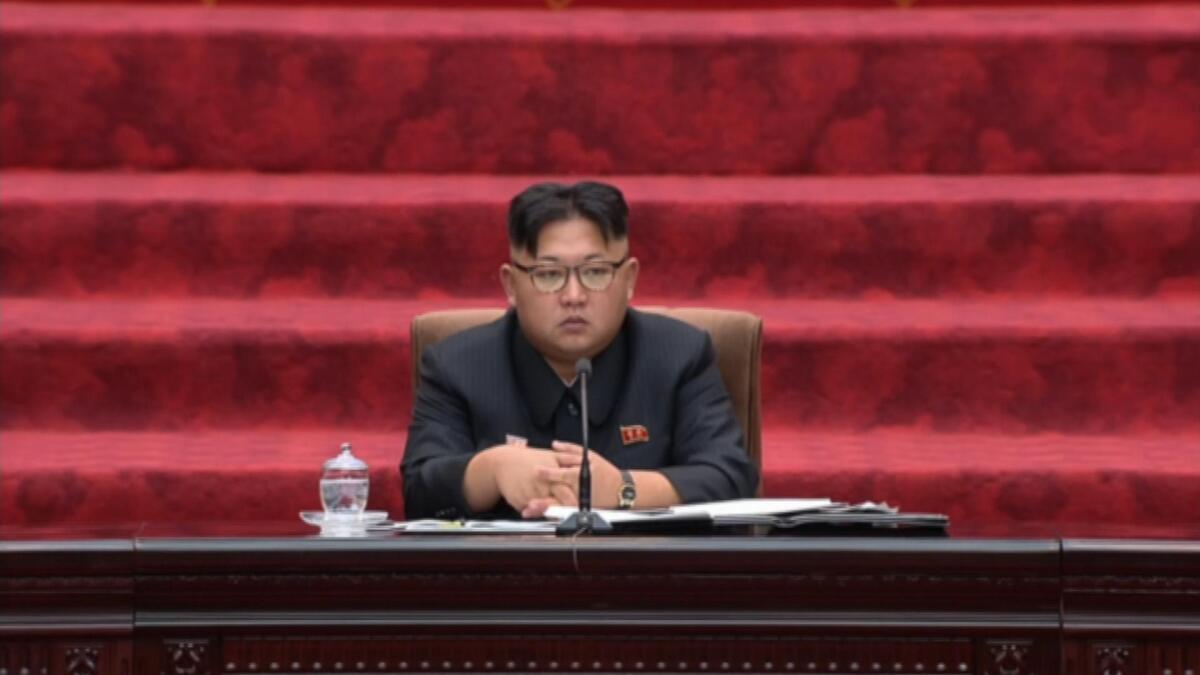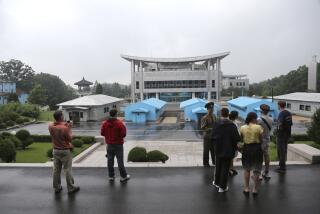New U.S. sanctions on North Korean leaders cite human rights abuses

- Share via
Reporting from Washington — The Obama administration slapped new sanctions on North Korea on Wednesday, taking the unusual step of placing the secretive country’s top leader and 10 other officials on a blacklist for human rights abusers.
North Korea is already subject to a raft of international sanctions that have been largely ineffective in stopping its leader, Kim Jong Un, from testing ballistic missiles and moving ahead with an ambitious nuclear weapons program.
This is the first time that Kim has been singled out personally on a sanctions list, which bars U.S. individuals and businesses from dealing with him and the other officials named.
“Under Kim Jong Un, North Korea continues to inflict intolerable cruelty and hardship on millions of its own people, including extrajudicial killings, forced labor and torture,” said Adam J. Szubin, acting undersecretary for terrorism and financial intelligence at the Treasury Department.
The blacklist freezes any assets that Kim or the others might have in the U.S. The Treasury announcement was accompanied by a congressionally mandated report from the State Department on atrocities in North Korea.
“Human rights abuses in [North Korea] are among the worst in the world,” State Department spokesman John Kirby said in briefing reporters on the new sanctions. He estimated that up to 120,000 people, including children and family members, are held in political prison camps in North Korea.
Kirby acknowledged that Kim is unpredictable and could just as likely resist any pressure from these latest sanctions. But listing names of alleged abusers from such a closed, hermetical country was a valuable – and difficult – exercise, he said.
“This puts them out in the domain in a way they wouldn’t necessarily have been,” Kirby said. “There is a power in naming them.”
See the most-read stories this hour >>
Four months ago, the administration joined the other 14 members of the United Nations Security Council to impose on Pyongyang what were portrayed as the toughest sanctions in more than two decades. Importantly, China, North Korea’s largest economic and political patron, joined in the action, which included ordering mandatory cargo inspections, a ban on the export of most natural resources and a prohibition on importing aviation fuel.
However, previous sanctions have always been a response to North Korea’s weapons programs and not its human rights record, said a senior State Department official, speaking anonymously in keeping with administration practices.
In addition to Kim, the official noted, other top Koreans on the list include Choe Pu Il, minister of public security, who is in charge of domestic surveillance and running the labor camps; and Cho Yon Jun, vice director of the “guidance department,” in charge of “ideological purity” and allegedly responsible for executions of those who defy Kim. Some are mid-level officials who direct the hunting down of defectors, the official said.
“We have no illusions that this is going to bring some sort of dramatic change in and of itself to North Korea,” the official added, “but simply lifting the anonymity of these functionaries may make them think twice from time to time when they consider a particular act of cruelty or repression.”
The penalties also targeted North Korean agencies responsible for propaganda. They follow legislation passed by Congress earlier this year ordering tougher sanctions and the production of the human rights report released Wednesday.
There was no immediate reaction from Pyongyang. After the U.N. sanctions in March, Kim ordered his military on standby and threatened to deploy nuclear warheads.
ALSO
South Korea’s newest menace: ‘Smartphone zombies’
China to explore outer space with its huge new radio telescope
North Korea is building something other than nukes: architecture with some zing
More to Read
Sign up for Essential California
The most important California stories and recommendations in your inbox every morning.
You may occasionally receive promotional content from the Los Angeles Times.











